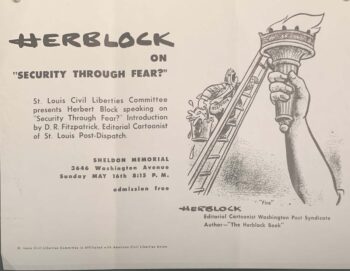
ACLU-MO History Spotlight: Liberty in Times of Crisis
A foundational concept of the ACLU since its founding in 1920 has been a particular attention to rights (especially free speech, rights to assembly, rights to organize, personal privacy) during times of war and national crisis.
Two notable moments where individual liberties were diminished in times of crisis include the 1950s fear of communists infiltrating the government and the anti-terrorism policies after September 11, 2001.
1950s
In 1955, a young African-American man, “Mr. Hill,” was suspended from his government job as a messenger for the VA Hospital. He was accused of going to “communist meetings”—one at the Art Theater for a free film and another at the public library. Mr. Hill was targeted as part of the Cold War hysteria that communists were infiltrating the federal government.
Volunteers from the St. Louis Civil Liberties Committee attended the security hearing and tred to speak up for Mr. Hill’s rights. Realizing Mr. Hill’s case “illustrates so many of the violations of our liberties existing under the present security rulings,” the Civil Liberties Committee worked with St. Louis’ new public television station, KETC channel 9, to broadcast a dramatic recreation of the hearing.
(*Mr. Hill was the pseudonym used by the Civil Liberties Committee to protect his privacy.)
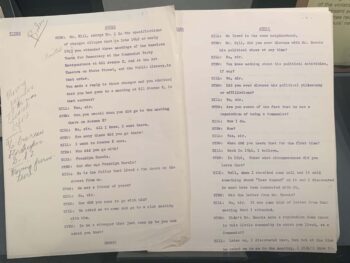
Series 3, Box 39, Committee 1955-1968
The St. Louis committee helped labor organizer William Sentner—one of five Missourians convicted of violating the Smith Act for speaking about communism and opposing the United States’ support for war in Korea.
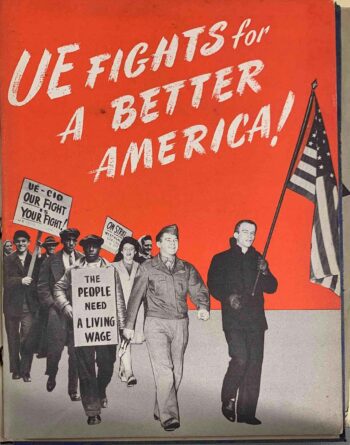
In 1958, Sentner appealed his conviction, and the St. Louis Civil Liberties Committee filed an amicus curiae or “friend of the court” brief in support. Although the courts ordered a new trial, Sentner tragically died of heart failure before it could be held.
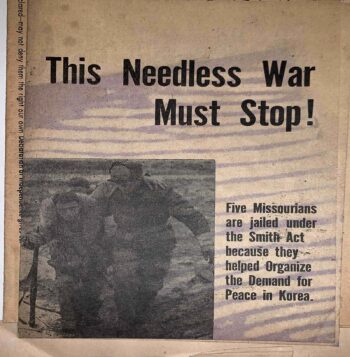
2001
The federal government implemented the USA–PATRIOT Act after September 11, 2001. This law resulted in warrant-less searches and seizures, spying on US citizens, and the jailing of thousands in secret without charges. People of Arab or South Asian descent were especially targeted.
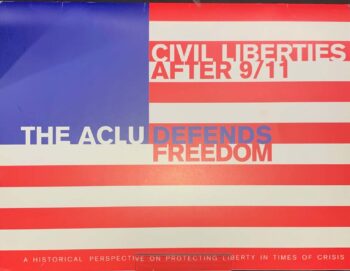
The ACLU of Eastern Missouri and the Islamic Foundation of Greater St. Louis created “Know your Rights” brochures in Arabic, Farsi, and other languages.
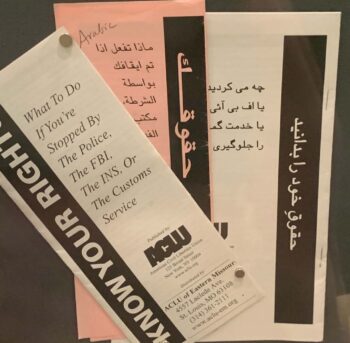
Volunteer monitors watched for human rights violations at immigration offices. Booklets and posters helped educate everyone about the impacts to civil liberties.
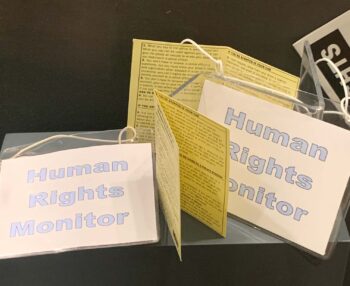
After numerous court cases across the nation, parts of the PATRIOT Act were changed in 2005. It was replaced by modified version, the USA Freedom Act, in 2015.
More
- Fuerer, Rosemary. Radical Unionism in the Midwest, 1900-1950 (University of Illinois Press, 2006)
- Johnson, Walter. The Broken Heart of America: St. Louis and the Violent History of the United States. (Basic Books, 2020)
- The ACLU Defends Freedom: A Historical Perspective on Protecting Liberty in Times of Crisis (National ACLU, 2002). Read the full-text PDF online.
ACLU-MO @ 100
This post is part of a series in recognition of the American Civil Liberties Union of Missouri’s centennial year (1920-2020). Read more stories at the following link: ACLU-MO @100 in News
If you have a question about this post or other topics related to St. Louis history, I can be reached at mrectenwald@wustl.edu or on Twitter: @mrectenwald

